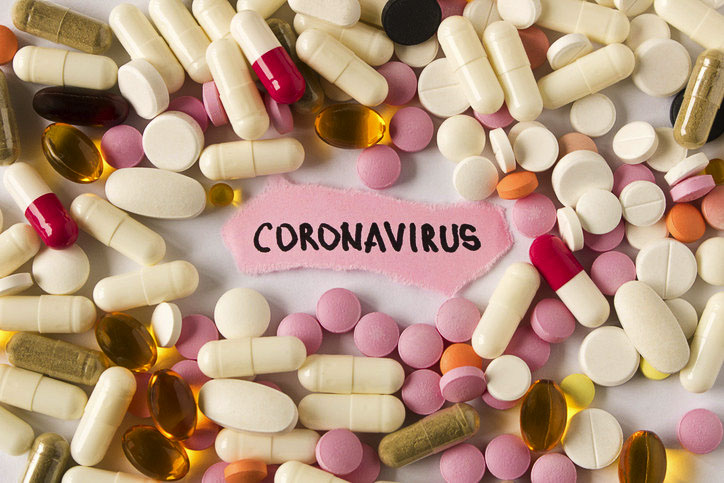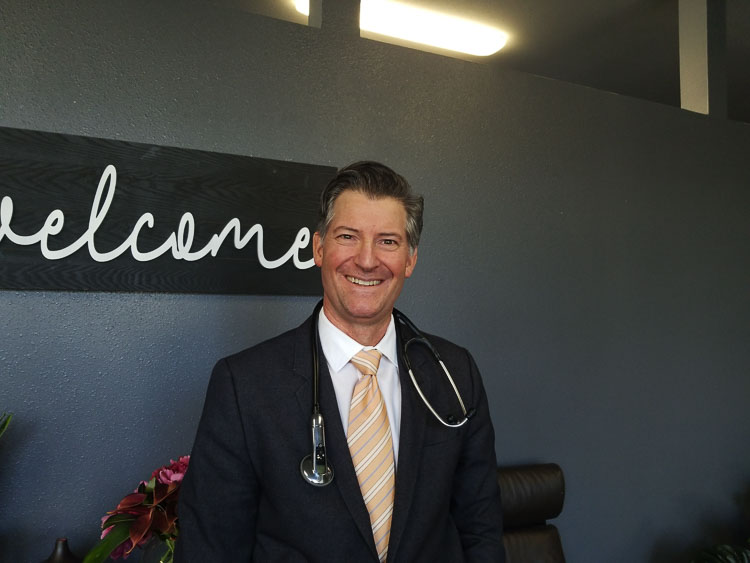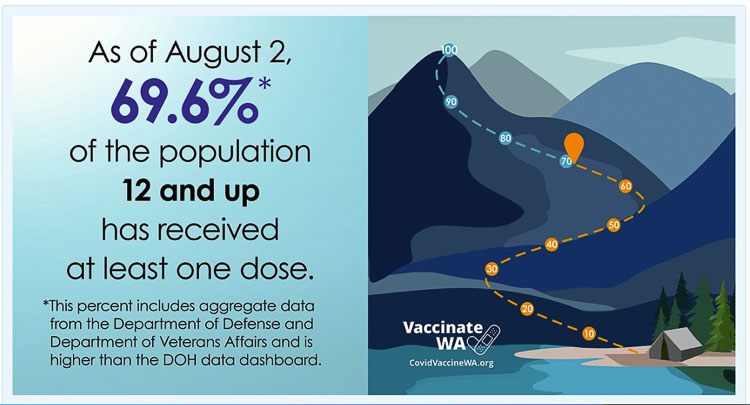Delta Variant is less deadly but spreads more easily
The Delta variant of the COVID-19 virus is now showing up in a majority of cases around the nation. In Washington state, as of Aug. 3, the Department of Health (DOH) reports 76 percent of new cases were the Delta strain, which is less deadly, but easier to pass on to others. Some news reports indicate it is spread easier than the common cold.
There are new warnings from the Centers for Disease Control and Prevention (CDC), as COVID-19 cases jump nationwide. With a more transmissible virus, how can you try to boost your immunity?
The DOH reports over 69 percent of Washington citizens have received at least one dose of the vaccine. Clark County Public Health reports 62 percent of residents have at least one dose.
Vaccinated individuals can get this strain of the virus, with Senator Lindsay Graham recently announcing he has COVID even after having been vaccinated. From a recent news report: “Delta infections among vaccinated likely contagious; Lambda variant shows vaccine resistance in lab.”
These are often being reported as “breakthrough cases.” At least 125,000 fully vaccinated Americans have tested positive for Covid and 1,400 of those have died according to news reports.

Some state officials said that they could not be sure the vaccinated individuals had died from COVID-19 or from other causes. But other states directly attribute the cause to COVID-19: 32 deaths in Louisiana, 52 in Washington state, 24 in Georgia, 49 in New Jersey, 169 in Illinois.
Breakthrough cases among the elderly were more likely to be serious, according to available data. In Washington state, 27 of the 52 people who died were known to be associated with long-term care facilities, according to state information. In Louisiana, the median age of those with severe outcomes was 73.
Senator Rand Paul, who is a doctor, recently revealed the following about the Delta variant. A 92,000 patient study from Public Health England reported that none of the vaccinated patients under the age of 50 died, after catching the Delta variant of COVID-19.
There were 52,000 unvaccinated people who got the Delta variant. Only six of those people died. “That works out to .08 percent,” Paul said. “That’s less than the flu.” For people over age 50, they’re dying at about half the rate as last year according to Paul.
In one Wisconsin study, health officials found similar viral loads in vaccinated and unvaccinated patients. In a separate study from Singapore, researchers found that while Delta viral loads were similar in vaccinated and unvaccinated patients, the viral loads decreased faster in the vaccinated group.
A Rockefeller University study found that among COVID-19 survivors, the immune system’s antibodies evolve during the first year, becoming more potent and better able to resist new variants.
Boosting your natural immune system
In a Clark County Today interview last fall, Physicians Assistant Scott Miller emphasized the importance of boosting one’s natural immune system. “I think that we haven’t done a very good job about getting this information out,” he said.
Miller shared that vitamin D is critical for boosting a person’s innate immune system. A low dose of melatonin will help. Most health providers talk about the benefits of vitamin D, vitamin C, zinc, and NAC according to Miller.
In a recent study, researchers concluded that Black women with deficient levels of vitamin D had a 69 percent higher risk of COVID-19 infection than those with sufficient vitamin D levels.
WebMD reports vitamin D boosts your immune system and eases inflammation. However more research is needed on its antiviral properties.

Harvard Medical School asked the following.” So, what suggests that vitamin C, vitamin D, zinc, and melatonin might help work against any virus?”
- Vitamin C is an antioxidant that has long been promoted as a key player in healthy immune function.
- Zinc may have antiviral activity, whether by improving immune cell function that counters viral infections or by reducing the ability of viruses to multiply.
- Some evidence (see this study and this study) suggests that combining vitamin C and zinc may limit the duration and severity of cold symptoms.
- The cases for vitamin D and melatonin differ. While there is also evidence that vitamin D and melatonin may have positive effects on immune function, a specific antiviral effect remains unproven.
Another international analysis evaluated eight studies from five countries about children and COVID-19. The analysis found that 45.9 percent of children who had suffered from the severe form of Covid had Vitamin D deficiency. It also found that children with Vitamin D deficiency were 5.5 times more susceptible to severe Covid and were thus more likely to either be admitted to the ICU or lose their lives to the pandemic.
A Bay County Florida doctor strongly suggested these precautions during a conference. “These are things that we have to do, Vitamin D, low calorie diet, goodnight’s sleep,” the doctor said. “And last but not least is to shower or flood our system with probiotics.”
Medical officials mentioned that it is important to receive high intakes of Vitamin D. For Black residents, the Florida doctor said it is even more important to ensure that they are receiving high amounts of Vitamin D.
Another doctor at the conference said in addition to supplements, he was encouraging more exercise. “Vitamin C on a daily basis. I do Zinc,” he said. “I’m taking Vitamin E, Vitamin D. Really, I’m making sure everything I can do to prevent getting sick.”
Dr. James Herd, Chief Medical Officer at Baylor Scott & White All Saints Medical Center, says it does appear that patients with lower levels of vitamin D have a higher association with COVID-19. “So there may be a protective effect of having a little bit higher vitamin D,” he said. Dr. Herd said there’s no downside to taking an added dose.
“There’s so much disinformation about these things,” Miller said.” This isn’t political; this is about making sure everyone has accurate information on things that can be done to make sure that we don’t have negative outcomes from this virus or from any infection.”
Miller shared that some of these things are things we can do to just help our bodies in general, in reference to his recommendations of vitamin D, vitamin C, and melatonin, especially for older people.

A Cleveland Clinic study last fall showed melatonin was associated with a 30 percent reduced likelihood of testing positive for COVID-19. However, additional studies are needed, the researchers said.
“Analysis of patient data from Cleveland Clinic’s COVID-19 registry also revealed that melatonin usage was associated with a nearly 30% reduced likelihood of testing positive for SARS-CoV-2 after adjusting for age, race, smoking history and various disease comorbidities. Notably, the reduced likelihood of testing positive for the virus increased from 30 to 52 percent for African Americans when adjusted for the same variables.”
“It is very important to note these findings do not suggest people should start to take melatonin without consulting their physician,” Feixiong Cheng, the lead author of the study said.
Most people know a good night’s sleep makes you feel better and improves your health.
As always, consult with your personal physician or healthcare provider in addressing your specific healthcare concerns.
Also read:
Opinion: We should be questioning the global suppression of early treatment options for COVID-19










